Another turn at the fire hose. Man, this is kind of dizzying. We’ve just seen a week in which the President has essentially undone the clean power plant rules, scuttled the Paris Accords on climate change, approved the Keystone XL pipeline project, and escalated his attacks on undocumented residents and on the poor miserable souls in Iraq, Syria, and Yemen who cope with our bombs on a daily basis. I could write five posts, but that would take the rest of human history, so suffice with this sorry tirade on foreign policy.
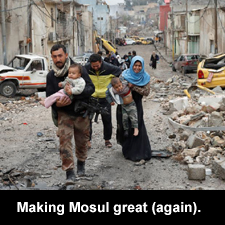 I didn’t want to let the week go by without saying something about the hundred-plus killed in a coalition raid in Mosul. Civilian deaths have been on the rise in that conflict since our military began its air assault on the more densely populated western side of Mosul. Well, that’s predictable enough. We are fighting the legacy of the previous decade’s catastrophic policy, which was itself a response to another previous decade’s catastrophic policy, and so on. ISIS or ISIL is Al Qaeda in Iraq 2.0, drawing on ex Baathist military personnel for many of its cadres, as well as disaffected Sunni youth, targeted by both the U.S. and the Baghdad government. The destruction/”liberation” of Mosul will not change the fundamental problems that prompted these people to turn, in desperation, to the extremists they once fought against.
I didn’t want to let the week go by without saying something about the hundred-plus killed in a coalition raid in Mosul. Civilian deaths have been on the rise in that conflict since our military began its air assault on the more densely populated western side of Mosul. Well, that’s predictable enough. We are fighting the legacy of the previous decade’s catastrophic policy, which was itself a response to another previous decade’s catastrophic policy, and so on. ISIS or ISIL is Al Qaeda in Iraq 2.0, drawing on ex Baathist military personnel for many of its cadres, as well as disaffected Sunni youth, targeted by both the U.S. and the Baghdad government. The destruction/”liberation” of Mosul will not change the fundamental problems that prompted these people to turn, in desperation, to the extremists they once fought against.
We are also doubling down in Syria, now with hundreds of Special Forces on the ground. And as actual journalists like Anand Ghopal have reported, the U.S. is effectively fighting in tandem with the Syrian government, particularly in places like Palmyra, where nominally pro-western groups like the Free Syrian Army cannot operate. Our bombers hit a mosque a few weeks back – like the Mosul raid, our military denied it, then gradually admitted it. Each one of these generates more converts to the jihadi cause, and contributes to another catastrophic policy that we will be grappling with in the next decade.
Then there’s the bleeding sore that is Yemen. The Intercept’s Iona Craig has reported extensively on the Al Ghayil raid that killed dozens of civilians in a mountainside village on the pretext that Al Qaeda leadership were in hiding there. They weren’t – some low-level operatives were reportedly in one of the buildings. The village has been in the thick of the Yemeni civil war, and residents thought the U.S. attackers were Houthi rebels – hence the armed resistance. Again … this “highly” successful raid appears to have aided the side we officially oppose in that fight, though that’s a minor consideration in light of the heavy casualties suffered by the people of Al Ghayil.
Only eight weeks in and these conflicts are getting even more septic. Not a good sign.
luv u,
jp

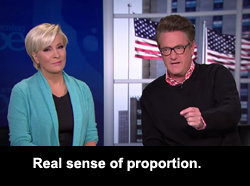 I could sit here an write about the obviously outrageous statements made by Trump over the 90 minute program, but you’ve probably heard enough of that. Suffice to say that the guy proves his unsuitability for the office of the presidency every time he opens his big yap. No one should need additional convincing, but alas … this is America. No, what astonishes me is some of what gets discussed (and what doesn’t get discussed) in the wake of these debates. That in itself is enough to make you want to rip your own head off. Take Syria. On MSNBC’s Morning Joe, it’s pretty much a consensus that the Syrian conflict is a failure of the Obama administration on the scale of Bush’s Iraq invasion. Scarborough himself regularly refers to the conflict with terms like “holocaust” and “genocide”, which is frankly offensive.
I could sit here an write about the obviously outrageous statements made by Trump over the 90 minute program, but you’ve probably heard enough of that. Suffice to say that the guy proves his unsuitability for the office of the presidency every time he opens his big yap. No one should need additional convincing, but alas … this is America. No, what astonishes me is some of what gets discussed (and what doesn’t get discussed) in the wake of these debates. That in itself is enough to make you want to rip your own head off. Take Syria. On MSNBC’s Morning Joe, it’s pretty much a consensus that the Syrian conflict is a failure of the Obama administration on the scale of Bush’s Iraq invasion. Scarborough himself regularly refers to the conflict with terms like “holocaust” and “genocide”, which is frankly offensive.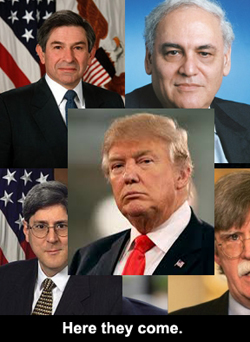 What would light a fire under these voters? Well, a more determined and effective candidate, for one. The Democrats have a good platform, they just need to push it harder. But there’s also clearly identifying and characterizing the opposition, not in terms of the singular problem of Trump but rather the broader Republican party as it is currently comported. Trump is a bombastic idiot and a hypersensitive man-baby with tiny hands, but his xenophobic rants reflect the core of the party that nominated him. Clinton should make that clear.
What would light a fire under these voters? Well, a more determined and effective candidate, for one. The Democrats have a good platform, they just need to push it harder. But there’s also clearly identifying and characterizing the opposition, not in terms of the singular problem of Trump but rather the broader Republican party as it is currently comported. Trump is a bombastic idiot and a hypersensitive man-baby with tiny hands, but his xenophobic rants reflect the core of the party that nominated him. Clinton should make that clear.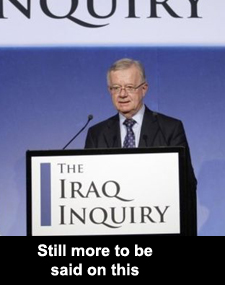 I am a fan of the Majority Report, particularly of their interview segments. This one is a must read for anyone frustrated with the state of legislative politics both on the state and the national levels. Dailey has done a deep dive into the Republican strategy to control redistricting after the 2010 census. Their calculated assault on the democratic process was wildly successful and will probably guarantee them House majorities for the rest of this decade and beyond. Using big data, sophisticated demographic mapping, and enough money to tip the balance in key state-level races in key states (i.e., states that would be redistricted after 2010), the GOP ran the table, catching the Democrats flat-footed. It’s a sobering indictment of the Dems’ lack of engagement and a real must-listen.
I am a fan of the Majority Report, particularly of their interview segments. This one is a must read for anyone frustrated with the state of legislative politics both on the state and the national levels. Dailey has done a deep dive into the Republican strategy to control redistricting after the 2010 census. Their calculated assault on the democratic process was wildly successful and will probably guarantee them House majorities for the rest of this decade and beyond. Using big data, sophisticated demographic mapping, and enough money to tip the balance in key state-level races in key states (i.e., states that would be redistricted after 2010), the GOP ran the table, catching the Democrats flat-footed. It’s a sobering indictment of the Dems’ lack of engagement and a real must-listen.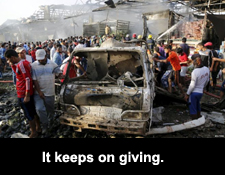 It was a week that started with the obscene bombing in Baghdad, the death toll for which has exceeded 250. As has long been the case, this provoked some small response in American culture because of the magnitude of the crime, but the degree of “hair-on-fire” apoplexy about terrorism has been relatively minimal due to the cultural distance between Iraq and the United States. As these attacks move closer culturally to the U.S., our politicians get more worked up. Forget this export we call “freedom” – that bombing is our gift to the Iraqi people and it just keeps on giving.
It was a week that started with the obscene bombing in Baghdad, the death toll for which has exceeded 250. As has long been the case, this provoked some small response in American culture because of the magnitude of the crime, but the degree of “hair-on-fire” apoplexy about terrorism has been relatively minimal due to the cultural distance between Iraq and the United States. As these attacks move closer culturally to the U.S., our politicians get more worked up. Forget this export we call “freedom” – that bombing is our gift to the Iraqi people and it just keeps on giving.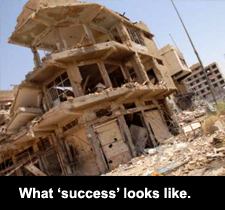 Today, the Baghdad government is ripping Fallujah yet another new asshole. It’s worth recalling that the ISIS militants they are fighting in that unfortunate city are mostly disaffected Sunnis, the most senior of which were probably part of Saddam’s army, the younger ones simply kids with no future, like so many Gazans or West Bank Palestinians. Malcolm Nance reminds us that, prior to our 2003 invasion, there were no Al Qaida to speak of in Iraq; after the invasion, they numbered in the low thousands. It wasn’t until the utter failure of the post-invasion regime to incorporate Sunnis into society (and, yes, the arrest and disappearance of many at the hands of the Iraqi security forces) that these young people became fodder for opportunistic Salafi organizations like ISIS.
Today, the Baghdad government is ripping Fallujah yet another new asshole. It’s worth recalling that the ISIS militants they are fighting in that unfortunate city are mostly disaffected Sunnis, the most senior of which were probably part of Saddam’s army, the younger ones simply kids with no future, like so many Gazans or West Bank Palestinians. Malcolm Nance reminds us that, prior to our 2003 invasion, there were no Al Qaida to speak of in Iraq; after the invasion, they numbered in the low thousands. It wasn’t until the utter failure of the post-invasion regime to incorporate Sunnis into society (and, yes, the arrest and disappearance of many at the hands of the Iraqi security forces) that these young people became fodder for opportunistic Salafi organizations like ISIS. Capitalism’s Failure. This is an issue that touches on everyone, young and old, working and unemployed or retired, poor and not-so-poor. The internal contradictions of American and, by extension, global capitalism came to a head in the crash of 2008, and we are still living in the aftermath of that disaster. Yes, the government can point to select data points that indicated a modest level of recovery, but the fact remains that an economic system that has consistently failed the vast majority of the population over the past 30 years has entered into an entirely new phase of failure. Most working Americans are toiling at the only job they can find, earning an inadequate rate of compensation. Our major cities are choked with legions of homeless people. This system is broken; it only serves the top one percent. We need to take a hard look at this, sooner rather than later.
Capitalism’s Failure. This is an issue that touches on everyone, young and old, working and unemployed or retired, poor and not-so-poor. The internal contradictions of American and, by extension, global capitalism came to a head in the crash of 2008, and we are still living in the aftermath of that disaster. Yes, the government can point to select data points that indicated a modest level of recovery, but the fact remains that an economic system that has consistently failed the vast majority of the population over the past 30 years has entered into an entirely new phase of failure. Most working Americans are toiling at the only job they can find, earning an inadequate rate of compensation. Our major cities are choked with legions of homeless people. This system is broken; it only serves the top one percent. We need to take a hard look at this, sooner rather than later.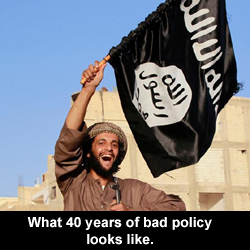 The trouble with approaching these issues with an imperial mindset is that we are blind to our own failures while expressing righteous indignation over the failings of others. Russia’s military action in Syria is a good example. They are perhaps the fifth or sixth power to drop bombs in that unfortunate country. Their strategy, while militaristic and morally bankrupt, is not difficult to understand – they view Islamic radicalism as an extreme threat, and they make the not unrealistic assumption that the fall of Syria’s government would result in a failed state something like Libya or Somalia or Iraq (all of which are beneficiaries of our aforementioned bellicosity). So, like the U.S.’s support of Saudi’s murderous campaign in Yemen, they are applying force in support of Assad’s crumbling regime.
The trouble with approaching these issues with an imperial mindset is that we are blind to our own failures while expressing righteous indignation over the failings of others. Russia’s military action in Syria is a good example. They are perhaps the fifth or sixth power to drop bombs in that unfortunate country. Their strategy, while militaristic and morally bankrupt, is not difficult to understand – they view Islamic radicalism as an extreme threat, and they make the not unrealistic assumption that the fall of Syria’s government would result in a failed state something like Libya or Somalia or Iraq (all of which are beneficiaries of our aforementioned bellicosity). So, like the U.S.’s support of Saudi’s murderous campaign in Yemen, they are applying force in support of Assad’s crumbling regime.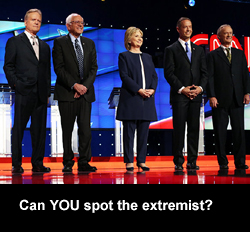 Okay, that was a sobering sign, to be sure. Even more infuriating than the sideshow atmospherics was the framing of the questions, delivered for the most part by Anderson Cooper. While the Democratic field is decidedly to the left, at least from a rhetorical perspective, of where they were even eight years ago, the corporate media questioners proceeded through the lens of Reagan’s America. The signal example of this for me was Cooper’s comment to Bernie Sanders about his support for the Sandinista government in Nicargua in the 1980s, as if that was a particularly controversial position in retrospect. (This can be equated with opposition to the Contra terror war against that government being pursued by the Reagan administration at the time – a war so broadly opposed by the American people that Congress had explicitly banned funding for the Contra forces.)
Okay, that was a sobering sign, to be sure. Even more infuriating than the sideshow atmospherics was the framing of the questions, delivered for the most part by Anderson Cooper. While the Democratic field is decidedly to the left, at least from a rhetorical perspective, of where they were even eight years ago, the corporate media questioners proceeded through the lens of Reagan’s America. The signal example of this for me was Cooper’s comment to Bernie Sanders about his support for the Sandinista government in Nicargua in the 1980s, as if that was a particularly controversial position in retrospect. (This can be equated with opposition to the Contra terror war against that government being pursued by the Reagan administration at the time – a war so broadly opposed by the American people that Congress had explicitly banned funding for the Contra forces.)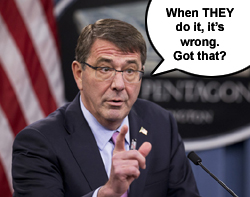 It is a bit maddening to see Defense Secretary Ash Carter denounce the Russians for being the gang that can’t shoot straight (which they apparently are) when only days ago our forces in Afghanistan blew up a Medecins Sans Frontieres hospital – an accident, of course (we seem to have a lot of them). While we’re railing against Putin, we might pause to remember that we have been in Afghanistan for fourteen years, and that the place is still ungovernable. We’ve been in Iraq for 12 years at some level or another, and large swaths of it are under the control of a group we profess to hate – ISIS or ISIL, nurtured in the government-free zone we carved out in the cradle of civilization, supported by Saudi and Turkey. (I guess the friends of our friends are somehow our enemies. And the enemies of our enemies … also our enemies. Have we no friends?)
It is a bit maddening to see Defense Secretary Ash Carter denounce the Russians for being the gang that can’t shoot straight (which they apparently are) when only days ago our forces in Afghanistan blew up a Medecins Sans Frontieres hospital – an accident, of course (we seem to have a lot of them). While we’re railing against Putin, we might pause to remember that we have been in Afghanistan for fourteen years, and that the place is still ungovernable. We’ve been in Iraq for 12 years at some level or another, and large swaths of it are under the control of a group we profess to hate – ISIS or ISIL, nurtured in the government-free zone we carved out in the cradle of civilization, supported by Saudi and Turkey. (I guess the friends of our friends are somehow our enemies. And the enemies of our enemies … also our enemies. Have we no friends?)